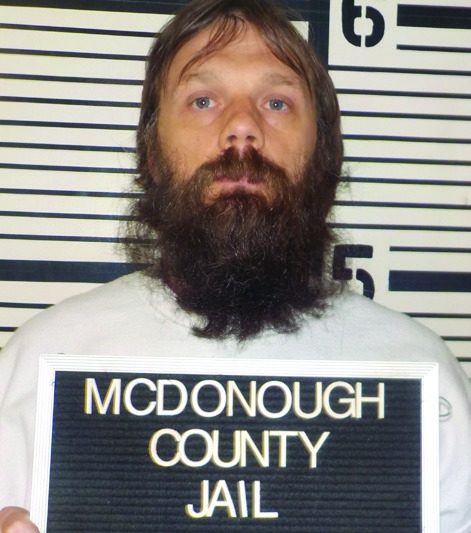Timothy Smith, 42, was found guilty but mentally ill of first-degree murder for the Nov. 8, 2023 beating death of his McDonough County Jail cellmate, Darrell Hocker, 50. The verdict came after a retrial, following a mistrial in June.
The five men/nine women jury deliberated for 1.5 hours Wednesday after 2.5 days of testimony. Smith’s sentencing will be held at 9 a.m., Oct. 16. He faces 20 to 60 years in prison, with 100 percent time to be served and a mandatory three years supervision.
The verdicts that the jury were to consider were not guilty; guilty; not guilty by reason of insanity, which means the defendant meets the legal definition of insanity at the time of the offense and is committed to a Department of Human Services facility where he could serve out his sentence and/or be released if DHS officials consider he is mentally fit and no longer a threat to society; and guilty but mentally ill, which means the defendant is sentenced to the Illinois Department of Corrections.
Smith’s re-trial began Monday following the jury selection. In his previous trial, the eight-man, fourwoman jury deadlocked after nearly six hours of deliberation.
McDonough County Circuit Court Judge Nigel Graham declared a mistrial June 12 when the jury failed to reach unanimous decision.
Smith has remained lodged in the McDonough County Jail since October 2023 for a previous incident. Smith, who chose not to attend the initial trial, was tried in absentia. He again chose not to attend his new trial, and was again tried in absentia. According to court proceedings, Smith was asked each day of the trial regarding his attendance and he willingly refused to participate, Graham noted. Smith was originally charged with two counts of first-degree murder for Hocker’s death.

Smith, who was 40 at the time, and Hocker were both being held on domestic battery charges at the time of their respective arrests. On Oct. 21, 2023, Smith was removed from the isolation cell and placed in a cell with another detainee (Hocker). Around 1 a.m., Nov. 8, 2023, and after two McDonough County jailers had finished their 20-minute rounds and had left the area where Smith and Hocker were being held together in a cell, Smith allegedly slipped off his top bunk and began beating Hocker. After hearing noise and yelling, the jailers returned to the pod (a common area which holds three individual cells) where they found Smith standing over Hocker, who was unresponsive. Hocker was transferred to McDonough District Hospital where he was pronounced deceased. Autopsy reports state that Hocker died from blunt force trauma and injuries sustained to the head, neck and chest.
McDonough County State’s Attorney Matt Kwacala opened the trial Monday, stating the jury was there because of a “brutal murder case.”
“You’re going to hear questions raised about the defendant’s mental health, but the facts remain, Mr. Smith was an inmate at the jail and was the cellmate of Darrell Hocker,” Kwacala told the jury. “You’ll hear that when the correctional officer looked into their cell, they saw Mr. Smith standing and Mr. Hocker on the ground in a very large pool of blood. And when Mr. Smith was removed from the cell, he exhibited no aggressive behavior toward the correctional officer.
“I have to prove this murder happened and that Mr. Smith did it,” he added. “I have no doubt that Mr. Smith murdered Mr. Hocker. Anything you hear about his mental health, remember these evaluations about his mental health took place one year after the murder happened. He was aware of what he was doing. He knew what he was doing. I ask that you find Mr. Smith guilty or guilty but mentally ill. I ask that you return a guilty verdict.”
Defense attorney Scott McClintock told the jury in his opening remarks that this is a “difficult brain exercise to figure out because insanity seems illogical to so many people.”
“We can’t figure out what’s going on in someone’s head, and that’s what we have going on here. We know the what, but we don’t know the why,” McClintock said. “Tim’s deteriorating mental health was evident, as you’ll hear from his family, over the seven months before this incident happened. He went from being a good, average citizen to going to jail to being bailed out again to going back into jail and murdering Darrell Hocker.
“You’ll hear from people that his mental health is not an act to get out of this. How do you arrive at a decision to find him not guilty by reason of insanity? You’ll hear from experts that he is criminally insane, is schizophrenic and was in a state of psychosis when this occurred,” he added. “I ask that you find Tim not guilty by reason of insanity.”
Closing Arguments
During closing arguments Wednesday, Matt Kwacala pointed out to the jury that before they consider if Smith was mentally ill at the time of the crime, the prosecution proved that Smith murdered Hocker.
“There were only two people in that cell. Mr. Smith was uninjured and Mr. Hocker was horribly beaten. And when Timothy Smith was removed from the cell, he made no threats to anyone. And when he was interviewed by Sgt. Beckett (of the Illinois State Police), he made eye contact and was cooperative,” Kwacala stressed. “He understood what was going on. Mr. Smith wasn’t talking about demons in his cell the night he beat Mr. Hocker to death. It was three months later that he mentioned demons. We have proven, without a reasonable doubt, that Mr. Smith killed Mr. Hocker.”
Kwacala also argued that the defense claims that Smith was insane at the time of the murder, so much that he couldn’t rationalize what he was doing were wrong and that Smith knew exactly what he was doing that evening.
“I think he embellished his mental deficiencies. He is not insane, but suffering from mental illness. He knew the timing of this – he knew when the television was turned off, when the lights went out and when the correctional officers made their rounds. He waited until all of this occurred and then he slipped out of his bunk and beat his cellmate to death,” Kwacala pressed on. “And the psychiatrist who testified – I don’t understand why she said he was suffering from psychosis from February 2023-January 2024 when she had no idea what was going on between March and October 2023. She didn’t even put this in her report, nor did she put in her report that during the three months he spent at the facility in Chester, where he did not take medication or need restraints and it was reported that he got along with others. Why didn’t she include this? Because it didn’t fit with her diagnosis.”
In his closing remarks, McClintock countered the state’s attorney’s argument that Smith knew what he was doing, stating that Smith’s mind is in so much disorder, he did not know he was committing a crime.
“We do not hold people criminally responsible if they are legally insane at the time of the crime. Evidence was introduced at this trial that leading up to Nov. 8, 2023, Tim was delusional and paranoid. His former attorney (James Hoyle) corroborated Tim Smith’s family’s testimony. Dr. Louck Davis went through the steps that experts in her fields follow to diagnose someone,” McClintock stressed. “Did she include everything? No. Why would you report things related to fitness versus insanity? It would make no sense. Mr. Kwacala doesn’t agree with her findings, but he didn’t present any other evidence to the contrary. I ask you to find Tim not guilty by reason of insanity. Not because he did not do it, but because he did not know what he was doing.”
Post-Trial Interviews Following the close of the trial, the Hocker family, his father and mother, Roger and Janet Hocker of Macomb, and sister, Cathy (Hocker) Slater, and her husband, Terry, all who attended each day of both trials, told The Community News Brief that they were not surprised by the verdict, and this day had been a “long time coming.”
“There were a lot of delays, and we still have the sentencing,” Roger said. “It’s not over until it’s over. The jury made the right decision today.”
McClintock told the Brief that while he was not entirely surprised at the guilty but mentally ill verdict, he was surprised at how quickly the jury reached its unanimous decision to convict his client, noting that he thought they’d deliberate longer given Louck Davis’ testimony to the issue of insanity.
When asked how he prepared for the trial the second time around, State Attorney Kwacala shared that he focused more on the characteristics and mannerisms of the defendant immediately following the murder.
“I also focused more on the testimony of Dr. Louck Davis and the omission of information that proved he was not insane,” Kwacala concluded. “I’m pleased with the verdict. I couldn’t see, given the evidence presented, how the jury could find him not guilty.
“I’m glad for the Hocker family that this part is over,” he added. “I hope this verdict brings them some measure of comfort.”
Smith Trial Testimonies
After the opening statements by each attorney on day one of the murder trial, McDonough County Sheriff Nick Petitgout narrated jailhouse video, describing the scene as it unfolded, including two final clips in which Smith was seen leaving the cell after the incident, with his hands in the air, escorted by a correctional officer, followed by two EMS workers carrying Hocker’s lifeless body from cell W1.
Illinois State Police crime scene investigator Sgt. Tim Beckett took the stand Tuesday morning, along with Correctional Officer Dominque Serta, ISP crime scene investigator Kurt Dykstra, two inmates who heard the ensuing beating and forensic pathologist Dr. Nathaniel Patterson.
Serta testified that after hearing shouting and entering Cell W1, she found Smith standing over Hocker. Beckett told the court that Smith had shared with him during an interview a few hours after Hocker’s death that he had “some trouble with his cellmate.” According to Dykstra, he processed the scene, collected and compiled evidence and information. During that process, Dykstra told the court that Smith had no visible wounds, and was cooperative during the interview.
In his testimony, Dr. Patterson stated that Hocker died as a result of blunt force injury to the head and neck, along with his chest being crushed. He also reported that Hocker had numerous other lacerations and injuries consistent with a severe beating.
Smith’s sister, Tanisha Malone, and brother-in-law, Greg Malone, who called Tim his best friend, testified Tuesday afternoon, along with Smith’s former attorney, James Hoyle.
Tanisha Malone testified that after their father died, she began seeing some changes in her brother’s behavior around early 2020, what she described as “conspiracy thinking,” such as imagining people were listening to, and spying on him and he could be found talking to people who weren’t there.
“He would only let people use phones around him from 7-8 p.m. because that’s when those watching him were taking a break. The TV was only allowed on during certain times and days, and he had the windows blacked out with cardboard, garbage bags and tarps,” she told the court.
In February 2023, he barricaded his wife and child in their home and would not allow them to leave. After his arrest, he called his sister. She said she bailed him out on the condition that he would live with her and her husband, get counseling and work, all of which he did.
“Beginning in March, there were other occurrences when he was living with us. He began saying more strange things like he was a millionaire, he owned McDonald’s and just off the wall things,” she started. “He would just pace up and down our driveway all day.”
A few months after living with the Malones, he voluntarily agreed to go to Blessing for mental health assistance, after being awake for more than four days and being “manic,” Tanisha told McClintock. That morning, as Tanisha was preparing to take him to Quincy, Smith became increasingly more agitated, which ended with him stabbing her with a pen and stealing her car. He also allegedly attacked his cousin that morning at a Macomb business. The Oct. 3, 2023 incidents led to his arrest, which once again placed him in the county jail, eventually housed in Cell W1 with Hocker.
During cross-examination, Kwacala asked Tanisha if she and Greg had any problems with Tim between 2019 and 2023, to which Tanisha answered “no.” Kwacala also pointed out that Tim had been employed at Bower until he was fired following his October 2023 arrest, to which she replied affirmatively and he also asked Tanisha if she had personally witnessed the changes in his behavior prior to him living with her family.
“I saw it once on my own. His wife had told me this was going on all the time,” she said.
Kwacala also asked Smith’s sister if she saw her brother on a regular basis prior to him moving in with her family, to which Tanisha explained she had no real contact with him between 2019 and 2023. Kwacala also asked Tanisha if she loved her brother, to which she replied, “very much.” He also asked if she wanted to see her brother convicted of murder.
“No, but it is what it is,” she concluded. Greg Malone’s testimony was similar to his wife’s, adding under questioning by McClintock that his friend’s and brother-in-law’s behavior got increasingly worse when he lived with them.
“I’ve never seen him this way before 2023,” Greg said. “I don’t know what happened to him. It wasn’t the Tim I knew.”
During the final day of the trial, Wednesday, Aug. 27, McClintock called forensic and clinical psychologist Dr. Amy Louck Davis to the witness stand.
“I looked at the course of events before, during and after November 8, 2023. The diagnosis of schizophrenia requires two or more criteria, such as delusions, hallucinations, false perceptions, aggression, erratic behavior and more. I also looked at the significant duration of symptoms, and Mr. Smith had more than six months of continuous symptoms,” she testified. “For an insanity defense, the law requires one to have a mental deficit and not understand what he did was criminal. Mr. Smith meets the defense of not guilty by reason of insanity.”
In his cross-examination, Kwacala asked Louck Davis if she had reviewed the report from Dr. Sudarshan Suneja, a psychologist at the Chester facility where Smith was held January-July 2024, in which she replied, yes.
In Suneja’s report, he wrote that Smith was not on medication for any mental illnesses, was well-groomed, was going to the dining hall regularly, showed no signs of aggression, no restraints were ever used and was determined fit to stand trial. Kwacala also asked why she used the testimony and report from Dr. Eckert, who only interviewed Mr. Smith for 30 minutes in January 2024, instead of the doctor and hospital report from Chester.
“I didn’t think it was helpful because I consider a bigger picture and longer timeframe,” she told the court. “I appreciate that the doctor didn’t feel he was schizophrenic, but felt he had resolved, which was typical of the disease. Dr. Suneja was determining fitness to stand trial, and not Tim Smith’s psychotic diagnosis. I felt Dr. Eckert’s interview was more relative to the timeline.”
Kwacala also asked the doctor if she had reviewed any video at the time of incident with Smith, or if she had watched any video of his interviews during the time of the incident, to which she replied “no” to both questions.
Louck Davis’ testimony concluded witness testimony.








